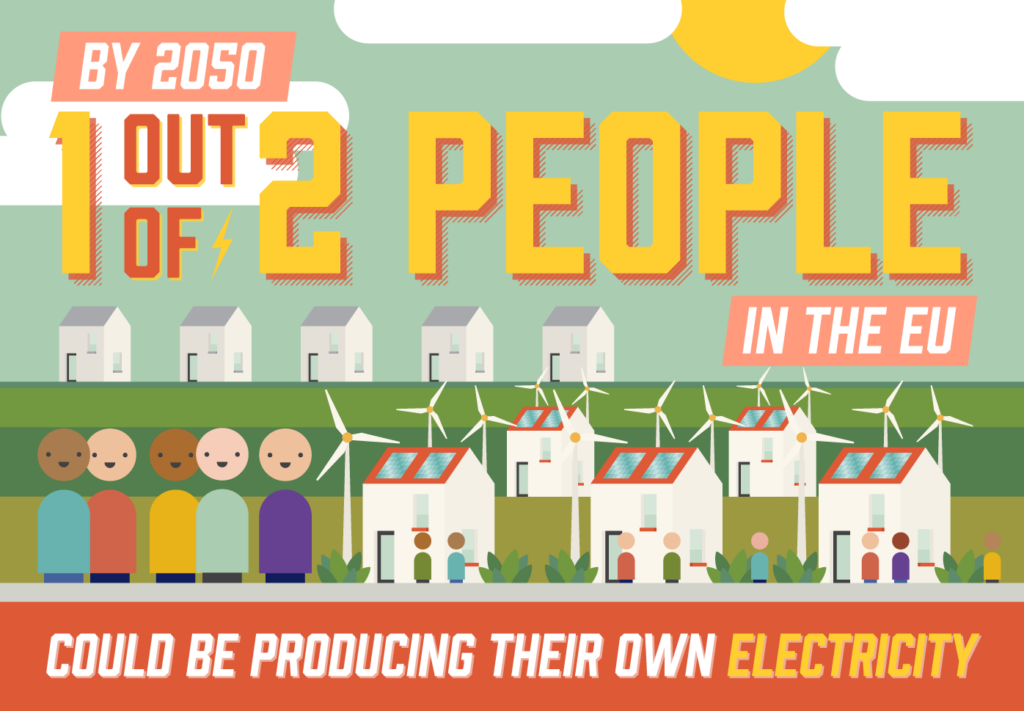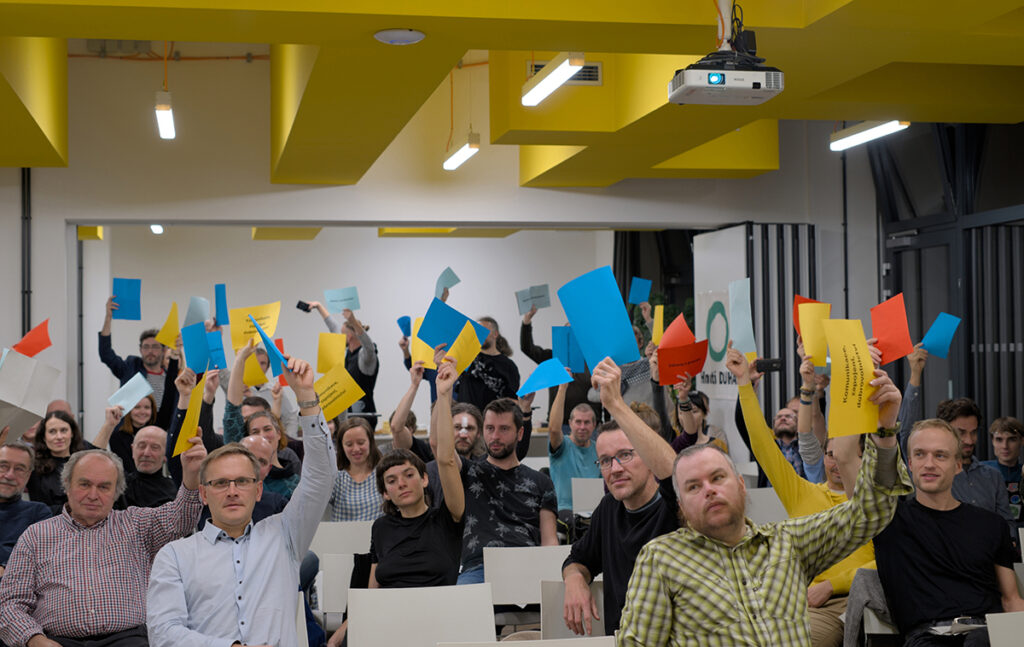Sharing is Caring
Local and affordable clean energy benefits us all.
Russia’s invasion of Ukraine jolted Europe awake. But it was the ensuing energy price crisis that truly laid bare the bankruptcy of our oligopolistic, fossil-based energy system. While private companies squeezed out billions of euros in profits, millions of EU citizens had to choose between eating and heating their home. 2023 saw a record rise of wind and solar generation again, leading to a structural decline of gas and coal.
This is a huge boost to the EU’s economy: 100 billion euros have been saved due to renewable energy additions between 2021-2023. At the same time, a study from the Technical University of Delft showed that by 2050 1 in 2 EU citizens could be producing their own electricity, covering 45% of the EU’s demand.

It thus begets the question: are we truly tapping into the potential of citizens to get involved – and benefit from – local renewable energy projects?
From Monopolies to Democratisation
Energy communities are largely defined as groups of citizens and local actors collaboratively implementing local energy transition projects, such as energy savings campaigns, collective housing renovations, or renewable project installations. Like winds of change, energy communities are spreading across Europe.
100 billion euros have been saved due to renewable energy additions between 2021-2023.
REScoop.eu, the European Federation of Citizen Energy Cooperatives, today marks over 2250 cooperative members, in turn representing over 2 million EU citizens.
The primary purpose of energy communities is to provide social and environmental benefits, such as tackling energy poverty and climate change, and not to generate financial profits. This makes them purpose-driven organisations that contribute to local development and increase resilience in times of crisis.
Economic studies demonstrate that community energy projects provide 2 to 8 times more economic benefits to the local area, over private for-profit renewable energy projects. Through measures like energy efficiency, and shifting consumption habits, energy communities can also help stabilise the grid.
Community energy projects provide 2 to 8 times more economic benefits to the local area, over private for-profit renewable energy projects.
Indeed, in REScoop.eu’s recently published manifesto, we call for Member States to ensure that local citizens have direct and easy access to local clean energy projects. This would accelerate the energy transition, and unlock benefits for all households, especially low-income and vulnerable ones. The trend is clear: more than ever, people are demanding a democratic energy system accessible to all, outside (corrupting) market forces.
Are we walking the walk?
Facilitating energy sharing is crucial for energy communities to develop and expand towards a transformative force in the energy market, and it can be a win-win scenario for people and the planet. However, the situation remains quite mixed on the ground in the Eastern part of Europe.
In Estonia community energy is a rather new concept, and a strong enabling framework is still missing (for example creating discounts for local energy sharing). Currently, an energy community could take the legal form of an ‘apartment association’, 1000 of which already exist in the country. However, there have been no substantive actions to facilitate energy sharing, or other activities. 2021 marked the establishment of Estonia’s first energy community, and citizens and public authority representatives are open, but still uneducated on the topic, resulting in limited interest. Clear (monetary) incentives to create community energy projects, as well as broader awareness campaigns, are still needed to fully operationalise the concept in the country.
In Hungary, local communities have been left out of the solar boom. While residential photovoltaic (PV) owners face soaring regulatory uncertainties, policies tend to favour large crony investors, thus reducing local participation in RES investments. In the meantime, there is a huge potential in community solutions, from the renovation of multi-apartment building blocks to neighbourhood electricity sharing. These grassroot innovations often face regulatory boundaries and hostile market behaviour of incumbents, such as network connection limitations by Distribution system operators (DSOs) and discriminatory supplier contracts.
In Czechia, communities and municipalities are eagerly awaiting the option to share electricity, which will finally come into force in July this year. Dozens of projects are already in the pipeline. With more than two years of delay in EU law transposition and energy communities finally enshrined into the national laws, 2024 will be a crucial year for energy sector democratisation in Czechia. Despite the overall enthusiasm, some economic and regulatory barriers still remain in place – access to grid infrastructure and high grid fees are one of them.
Towards a local, secure, clean energy system
There is no one-size-fits-all approach to facilitating energy sharing, but there are some overarching guiding principles. Based on EU legislation, grid operators should cooperate with energy communities to help facilitate local transfers of energy. Any citizen, or energy community that wants to establish an energy sharing project should be able to access all the necessary information in a local One-Stop-Shop, with a clear and transparent timeline, simplified bureaucracy, and advice on access to finance.
This is already the case in several countries, including Austria and Spain. Ultimately, Member States need to progress with the transposition of the EU provisions for energy communities in their national legislation and effectively implement an enabling framework for them to be able to engage in different activities, including energy sharing, without all the barriers that currently exist at the national level.

The (renewable) energy revolution is already sweeping across the globe. It’s no longer only the – existential – issue of tackling climate change that’s incentivising countries to invest in clean energy.
In this new industrial boom, citizens and communities are crucial to transform our economy to a sustainable, democratic and just alternative. Embracing this transition is a scientific, moral, and economic no-brainer, but this will only succeed if communities are genuinely included, and benefit from it.